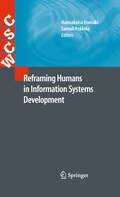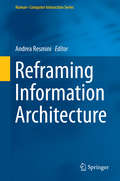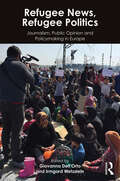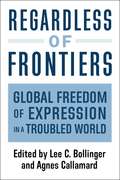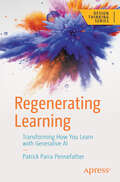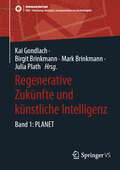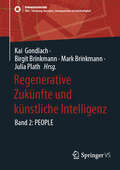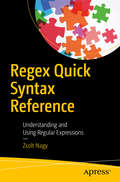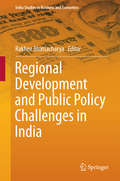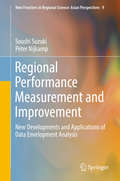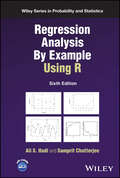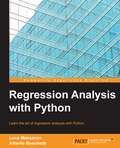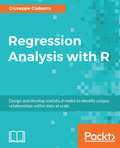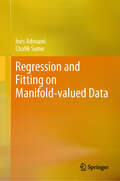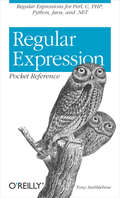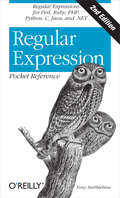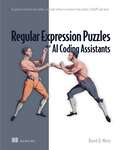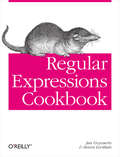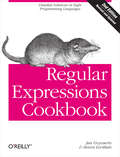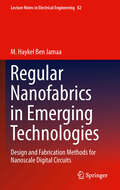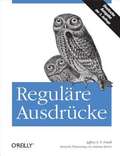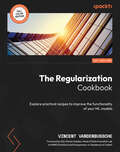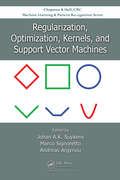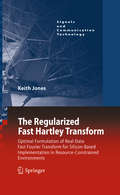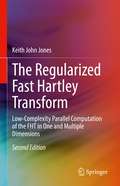- Table View
- List View
Reframing Humans in Information Systems Development
by Hannakaisa Isomäki Samuli PekkolaModern society has been transformed by the digital convergence towards a future where technologies embed themselves into the fabric of everyday life. This ongoing merging of social and technological infrastructures provides and necessitates new possibilities to renovate past notions, models and methods of information systems development that accommodates humans as actors within the infrastructure. This shift introduces new possibilities for information systems designers to fulfil more and more everyday functions, and to enhance their value and worth to the user. Reframing Humans in Information Systems Development aims to reframe the phenomenon of human-centered development of information systems by connecting scientific constructs produced within the field of information systems which has recently provided a plethora of multidisciplinary user views, without explicitly defining clear constructs that serve the IS field in particular. IS researchers, practitioners and students would benefit from Reframing Humans in Information Systems Development as the book provides a comprehensive view to various human-centered development methods and approaches. The representatives of the fields of Human-Computer Interaction and Computer Supported Collaborative Work will also find this book an excellent resource. A theoretical handbook and collection of practical experiences, are included along with critical discussions of the utilization methods in ISD and their implications with some interconnecting commentary viewpoints.
Reframing Information Architecture
by Andrea ResminiInformation architecture has changed dramatically since the mid-1990s and earlier conceptions of the world and the internet being different and separate have given way to a much more complex scenario in the present day. In the post-digital world that we now inhabit the digital and the physical blend easily and our activities and usage of information takes place through multiple contexts and via multiple devices and unstable, emergent choreographies. Information architecture now is steadily growing into a channel- or medium-specific multi-disciplinary framework, with contributions coming from architecture, urban planning, design and systems thinking, cognitive science, new media, anthropology. All these have been heavily reshaping the practice: conversations about labelling, websites, and hierarchies are replaced by conversations about sense-making, place-making, design, architecture, cross media, complexity, embodied cognition and their application to the architecture of information spaces as places we live in in an increasingly large part of our lives. Via narratives, frameworks, references, approaches and case-studies this book explores these changes and offers a way to reconceptualize the shifting role and nature of information architecture where information permeates digital and physical space, users are producers and products are increasingly becoming complex cross-channel or multi-channel services.
Refugee News, Refugee Politics: Journalism, Public Opinion and Policymaking in Europe
by Irmgard Wetzstein Giovanna Dell’OrtoThe unprecedented arrival of more than a million refugees, asylum seekers, and migrants – plus the political, public, and policy reactions to it – is redefining Europe. The repercussions will last for generations on such central issues as security, national identity, human rights, and the very structure of liberal democracies. What is the role of the news media in telling the story of the 2010s refugee crisis at a time of deepening crisis for journalism, as “fake news” ran rampant amid an increasingly distrustful public? This volume offers students, scholars, and the general reader original research and candid frontline insights to understand the intersecting influences of journalistic practices, news discourses, public opinion, and policymaking on one of the most polarizing issues of our time. Focusing on current events in Greece, Austria, and Germany – critical entry and destination countries – it introduces a groundbreaking dialogue between elite national and international media, academic institutions, and civil society organizations, revealing the complex impacts of the news media on the thorny sociopolitical dilemmas raised by the integration of hundreds of thousands of asylum seekers in EU countries.
Regardless of Frontiers: Global Freedom of Expression in a Troubled World
by Lee C. Bollinger and Agnès CallamardThe United Nations’ Universal Declaration of Human Rights in 1948 proclaimed a vision of freedom of expression exercised regardless of frontiers. Nonetheless, laws and norms regarding the freedom or limits of expression are typically established and understood at the national level. In today’s interconnected world, newfound threats to free expression have suddenly arisen. How can this fundamental right be secured at a global level?This volume brings together leading experts from a variety of fields to critically evaluate the extent to which global norms on freedom of expression and information have been established and which actors and institutions have contributed to their diffusion. The authors also consider ongoing and new challenges to these norms, from conflicts over hate speech and the rise of populism to authoritarian governments, as well as the profound disruption introduced by the internet. Together, the essays lay the groundwork for an international legal doctrine on global freedom of expression that considers issues such as access to government-held information, media diversity, and political speech. As the world risks renouncing previous commitments to the freedom of expression, Regardless of Frontiers serves as a timely reminder of just how much is at stake and what needs protecting.
Regenerating Learning: Transforming How You Learn with Generative AI (Design Thinking)
by Patrick Parra PennefatherThe perfect storm of learning provoked by generative AI is not just about learning how to use the technology to change human patterns of work and life. The technologies are re-orienting how we think we learn, what we learn, what we need to learn, when and where we learn about knowledge production, how humans communicate with each other, the economic, social, political, creative, ethical and technological factors that inform how we navigate human influenced existence on this planet. The technology empowers you to reimagine and reinvent how you learn while doing your work. Just like you can regenerate content persistently using generative AI systems, so too can you regenerate what and how you learn. Regenerating Learning will help guide the small team you are a part of, or influence leadership to leverage generative AI systems responsibly. Besides pointing to all the more obvious benefits of learning how to use generative AI systems more effectively, this book provides use cases, research and educational theory to propose that interacting with the technology leads to a number of unanticipated learning outcomes. These outcomes challenge the very way in which we have come to learn, what we have learned, and what we may need to unlearn. As generative AI becomes increasingly integrated within workplace environments at some point or other we will each need to decide if we are going to use the technology and how. What You will Learn • Methods and techniques to re-learn how you learn through your interactions with different generative AI. • Strategic approaches to integrate generative AI within your workflows. • How to iterate, adapt, prototype and learn continuously with generative AI. • A variety of tools and approaches to reconcile your organization’s use of generative AI. • How to develop a road map towards the integration of AI systems within your organization. Who this Book Is For Creatives, team leaders, managers and leadership in different organizations; teams in collaborative and creative industries; managers and employees in organizational learning
Regenerative Zukünfte und künstliche Intelligenz: Band 1: PLANET (SDG - Forschung, Konzepte, Lösungsansätze zur Nachhaltigkeit)
by Kai Gondlach Birgit Brinkmann Mark Brinkmann Julia PlathDieses Buchprojekt erscheint in drei Teilen mit jeweils einem inhaltlichen Schwerpunkt – PLANET, PEOPLE, PROFIT – und beschäftigt sich übergreifend mit den Nachhaltigkeitszielen der Vereinten Nationen (Sustainable Development Goals, SDGs). Dieser erste Band behandelt die ökologische Dimension der Nachhaltigkeit und umfasst Beiträge, die explizit oder implizit SDGs mit Umweltbezug thematisieren. Die Beiträge und Grußworte international renommierter Expert:innen aus Wissenschaft und Praxis werden durch Begleittexte der Herausgebenden ergänzt. „Wir wissen genug, wir können genug. Wir müssen uns jetzt trauen, den richtigen Weg einzuschlagen“, aus dem Grußwort von Prof. Dr. Johan Rockström, Potsdam-Institut für Klimafolgenforschung.
Regenerative Zukünfte und künstliche Intelligenz: Band 2: PEOPLE (SDG - Forschung, Konzepte, Lösungsansätze zur Nachhaltigkeit)
by Kai Gondlach Birgit Brinkmann Mark Brinkmann Julia PlathDer Band basiert auf den 17 Entwicklungszielen (SDGs) der UNO und entwickelt für die Wirtschaft Zukunftsperspektiven zum Zusammenhang von KI und Nachhaltigkeit.
Regex Quick Syntax Reference: Understanding and Using Regular Expressions
by Zsolt NagyThis quick guide to regular expressions is a condensed code and syntax reference for an important programming technique. It demonstrates regex syntax in a well-organized format that can be used as a handy reference, showing you how to execute regexes in many languages, including JavaScript, Python, Java, and C#.The Regex Quick Syntax Reference features short, focused code examples that show you how to use regular expressions to validate user input, split strings, parse input, and match patterns. Utilizing regular expressions to deal with search/replace and filtering data for backend coding is also covered. You won’t find any bloated samples, drawn out history lessons, or witty stories in this book. What you will find is a language reference that is concise and highly accessible. The book is packed with useful information and is a must-have for any programmer.What You Will LearnFormulate an expressionWork with arbitrary char classes, disjunctions, and operator precedenceExecute regular expressions and visualize using finite state machinesDeal with modifiers, including greedy and lazy loops Handle substring extraction from regex using Perl 6 capture groups, capture substrings, and reuse substrings Who This Book Is ForIf you have dealt with at least one programming language, chances are you know enough to understand regular expressions, and the examples in this book will help you develop proficiency.
Regional Development and Public Policy Challenges in India
by Rakhee BhattacharyaThis book emphasizes the need for experimenting with more deliberate and rigorous policy processes to attain balanced regional development, which can promote both equity and efficiency in India's development discourse. The institutional mechanisms for dealing with regional imbalance in India have not been very successful so far. With rising discrepancies in development, demand for autonomy continues along with a new dimension of regionalism arising from submerged identity along with political and economic aspirations, which demanded new channels for solution. So far, attempts to create space for autonomy have possibly not optimally accommodated the conceptual mechanisms like equity and democratic process. Thus democratizing policy process using six pillars of voice: knowledge, objective, fundamental values, implementation framework and public awareness can ensure a better policy outcome for dealing with the persistent challenges of regional disparity in India. This book further focuses on the need for democratizing the policy process for regional development through discussion and inclusion. Such a transition needs innovation in policy regime, which can be attained through following six pillars (i) Democratic voice of stakeholders in policy development and implementation; (ii) Clear policy objectives that advance the common good, based on voice; (iii) Unbiased, sound and comprehensive knowledge and data bases. (iv) Consistency with constitutional values; (v) A sound implementation framework ensuring user-friendliness, transparency and rationality of decision-making processes, effective grievance redress, clear accountability and independent evaluation; (vi) Public awareness and support of policies with relevant and public participation in implementation.
Regional Performance Measurement and Improvement
by Soushi Suzuki Peter NijkampThis is the first book to fully introduce a newly developed distance friction minimization (DFM) model, which is one of the new efficiency improvement projection approaches in data envelopment analysis (DEA). The DFM model can produce a most effective solution in efficiency improvement projections for inefficient spatial entities (decision-making units). The book provides a set of fresh contributions to a quantitative assessment of the performance of such policy entities. First it offers a state-of-the art overview of current DEA models and approaches, followed by the operational design of various new types of DEA models, each of them addressing weaknesses in traditional DEA approaches. Then it illustrates the assessment potential of DEA -- and its new variants, in particular, the DFM model and subsequent extensions -- on the basis of a broadly composed collection of empirical case studies, centering mainly but not exclusively on Japan and other Asian nations. gement, and related fields. New model applications offer a meaningful contribution to decision making and planning for operational efficiency improvement in these fields.
Regression Analysis By Example Using R (Wiley Series in Probability and Statistics)
by Ali S. Hadi Samprit ChatterjeeRegression Analysis By Example Using R A STRAIGHTFORWARD AND CONCISE DISCUSSION OF THE ESSENTIALS OF REGRESSION ANALYSIS In the newly revised sixth edition of Regression Analysis By Example Using R, distinguished statistician Dr Ali S. Hadi delivers an expanded and thoroughly updated discussion of exploratory data analysis using regression analysis in R. The book provides in-depth treatments of regression diagnostics, transformation, multicollinearity, logistic regression, and robust regression. The author clearly demonstrates effective methods of regression analysis with examples that contain the types of data irregularities commonly encountered in the real world. This newest edition also offers a brand-new, easy to read chapter on the freely available statistical software package R. Readers will also find: Reorganized, expanded, and upgraded exercises at the end of each chapter with an emphasis on data analysis Updated data sets and examples throughout the book Complimentary access to a companion website that provides data sets in xlsx, csv, and txt format Perfect for upper-level undergraduate or beginning graduate students in statistics, mathematics, biostatistics, and computer science programs, Regression Analysis By Example Using R will also benefit readers who need a reference for quick updates on regression methods and applications.
Regression Analysis with Python
by Alberto Boschetti Luca MassaronLearn the art of regression analysis with Python About This Book * Become competent at implementing regression analysis in Python * Solve some of the complex data science problems related to predicting outcomes * Get to grips with various types of regression for effective data analysis Who This Book Is For The book targets Python developers, with a basic understanding of data science, statistics, and math, who want to learn how to do regression analysis on a dataset. It is beneficial if you have some knowledge of statistics and data science. What You Will Learn * Format a dataset for regression and evaluate its performance * Apply multiple linear regression to real-world problems * Learn to classify training points * Create an observation matrix, using different techniques of data analysis and cleaning * Apply several techniques to decrease (and eventually fix) any overfitting problem * Learn to scale linear models to a big dataset and deal with incremental data In Detail Regression is the process of learning relationships between inputs and continuous outputs from example data, which enables predictions for novel inputs. There are many kinds of regression algorithms, and the aim of this book is to explain which is the right one to use for each set of problems and how to prepare real-world data for it. With this book you will learn to define a simple regression problem and evaluate its performance. The book will help you understand how to properly parse a dataset, clean it, and create an output matrix optimally built for regression. You will begin with a simple regression algorithm to solve some data science problems and then progress to more complex algorithms. The book will enable you to use regression models to predict outcomes and take critical business decisions. Through the book, you will gain knowledge to use Python for building fast better linear models and to apply the results in Python or in any computer language you prefer. Style and approach This is a practical tutorial-based book. You will be given an example problem and then supplied with the relevant code and how to walk through it. The details are provided in a step by step manner, followed by a thorough explanation of the math underlying the solution. This approach will help you leverage your own data using the same techniques.
Regression Analysis with R: Design and develop statistical nodes to identify unique relationships within data at scale
by Giuseppe CiaburroBuild effective regression models in R to extract valuable insights from real data Key Features Implement different regression analysis techniques to solve common problems in data science - from data exploration to dealing with missing values From Simple Linear Regression to Logistic Regression - this book covers all regression techniques and their implementation in R A complete guide to building effective regression models in R and interpreting results from them to make valuable predictions Book Description Regression analysis is a statistical process which enables prediction of relationships between variables. The predictions are based on the casual effect of one variable upon another. Regression techniques for modeling and analyzing are employed on large set of data in order to reveal hidden relationship among the variables. This book will give you a rundown explaining what regression analysis is, explaining you the process from scratch. The first few chapters give an understanding of what the different types of learning are – supervised and unsupervised, how these learnings differ from each other. We then move to covering the supervised learning in details covering the various aspects of regression analysis. The outline of chapters are arranged in a way that gives a feel of all the steps covered in a data science process – loading the training dataset, handling missing values, EDA on the dataset, transformations and feature engineering, model building, assessing the model fitting and performance, and finally making predictions on unseen datasets. Each chapter starts with explaining the theoretical concepts and once the reader gets comfortable with the theory, we move to the practical examples to support the understanding. The practical examples are illustrated using R code including the different packages in R such as R Stats, Caret and so on. Each chapter is a mix of theory and practical examples. By the end of this book you will know all the concepts and pain-points related to regression analysis, and you will be able to implement your learning in your projects. What you will learn 1. Get started with the journey of data science using Simple linear regression 2. Deal with interaction, collinearity and other problems using multiple linear regression 3. Understand diagnostics and what to do if the assumptions fail with proper analysis 4. Load your dataset, treat missing values, and plot relationships with exploratory data analysis 5. Develop a perfect model keeping overfitting, under-fitting, and cross-validation into consideration 6. Deal with classification problems by applying Logistic regression 7. Explore other regression techniques – Decision trees, Bagging, and Boosting techniques 8. Learn by getting it all in action with the help of a real world case study.Who this book is for This book is intended for budding data scientists and data analysts who want to implement regression analysis techniques using R. If you are interested in statistics, data science, machine learning and wants to get an easy introduction to the topic, then this book is what you need! Basic understanding of statistics and math will help you to get the most out of the book. Some programming experience with R will also be helpful
Regression and Fitting on Manifold-valued Data
by Ines Adouani Chafik SamirThis book introduces in a constructive manner a general framework for regression and fitting methods for many applications and tasks involving data on manifolds. The methodology has important and varied applications in machine learning, medicine, robotics, biology, computer vision, human biometrics, nanomanufacturing, signal processing, and image analysis, etc. The first chapter gives motivation examples, a wide range of applications, raised challenges, raised challenges, and some concerns. The second chapter gives a comprehensive exploration and step-by-step illustrations for Euclidean cases. Another dedicated chapter covers the geometric tools needed for each manifold and provides expressions and key notions for any application for manifold-valued data. All loss functions and optimization methods are given as algorithms and can be easily implemented. In particular, many popular manifolds are considered with derived and specific formulations. The same philosophy is used in all chapters and all novelties are illustrated with intuitive examples. Additionally, each chapter includes simulations and experiments on real-world problems for understanding and potential extensions for a wide range of applications.
Regular Expression Pocket Reference
by Tony StubblebineRegular expressions are such a powerful tool for manipulating text and data that anyone who uses a computer can benefit from them. Composed of a mixture of symbols and text, regular expressions can be an outlet for creativity, for brilliant programming, and for the elegant solution. While a command of regular expressions is an invaluable skill, all there is to know about them fills a very large volume, and you don't always have time to thumb through hundreds of pages each time a question arises. The answer is the Regular Expression Pocket Reference. Concise and easy-to-use, this little book is the portable companion to Mastering Regular Expressions. This handy guide offers programmers a complete overview of the syntax and semantics of regular expressions that are at the heart of every text-processing application. Ideal as an introduction for beginners and a quick reference for advanced programmers, Regular Expression Pocket Reference is a comprehensive guide to regular expression APIs for C, Perl, PHP,Java, .NET, Python, vi, and the POSIX regular expression libraries. O'Reilly's Pocket References have become a favorite among programmers everywhere. By providing a wealth of important details in a concise, well-organized format, these handy books deliver just what you need to complete the task at hand. When you've reached a sticking point and need to get to a solution quickly, the new Regular Expression Pocket Reference is the book you'll want to have.
Regular Expression Pocket Reference: Regular Expressions for Perl, Ruby, PHP, Python, C, Java and .NET
by Tony StubblebineThis handy little book offers programmers a complete overview of the syntax and semantics of regular expressions that are at the heart of every text-processing application. Ideal as a quick reference, Regular Expression Pocket Reference covers the regular expression APIs for Perl 5.8, Ruby (including some upcoming 1.9 features), Java, PHP, .NET and C#, Python, vi, JavaScript, and the PCRE regular expression libraries.This concise and easy-to-use reference puts a very powerful tool for manipulating text and data right at your fingertips. Composed of a mixture of symbols and text, regular expressions can be an outlet for creativity, for brilliant programming, and for the elegant solution. Regular Expression Pocket Reference offers an introduction to regular expressions, pattern matching, metacharacters, modes and constructs, and then provides separate sections for each of the language APIs, with complete regex listings including:Supported metacharacters for each language APIRegular expression classes and interfaces for Ruby, Java, .NET, and C#Regular expression operators for Perl 5.8Regular expression module objects and functions for PythonPattern-matching functions for PHP and the vi editorPattern-matching methods and objects for JavaScriptUnicode Support for each of the languagesWith plenty of examples and other resources, Regular Expression Pocket Reference summarizes the complex rules for performing this critical text-processing function, and presents this often-confusing topic in a friendly and well-organized format. This guide makes an ideal on-the-job companion.
Regular Expression Puzzles and AI Coding Assistants: 24 puzzles solved by the author, with and without assistance from Copilot, ChatGPT and more
by Mertz DavidLearn how AI-assisted coding using ChatGPT and GitHub Copilot can dramatically increase your productivity (and fun) writing regular expressions and other programs.Regular Expression Puzzles and AI Coding Assistants is the story of two competitors. On one side is David Mertz, an expert programmer and the author of the Web's most popular Regex tutorial. On the other are the AI powerhouse coding assistants, GitHub Copilot and OpenAI ChatGPT. Here's how the contest works: David invents 24 Regex problems he calls puzzles and shows you how to tackle each one. When he's done, he has Copilot and ChatGPT work the same puzzles. What they produce intrigues him. Which side is likelier to get it right? Which will write simple and elegant code? Which makes smarter use of lesser known Regex library features? Read the book to find out. David also offers AI best practices, showing how smart prompts return better results. By the end, you'll be a master at solving your own Regex puzzles, whether you use AI or not. About the technology Groundbreaking large language model research from OpenAI, Google, Amazon, and others have transformed expectations of machine-generated software. But how do these AI assistants, like ChatGPT and GitHub Copilot, measure up against regular expressions—a workhorse technology for developers used to describe, find, and manipulate patterns in text. Regular expressions are compact, complex, and subtle. Will AI assistants handle the challenge? About the book Regular Expression Puzzles and AI Coding Assistants is the perfect starting point for programmers of any experience level who want to understand the capabilities—and the limitations—of these exciting new tools. Author David Mertz presents 24 challenging regex puzzles, their traditional human-made solutions, and the fascinating answers given by popular AI assistants. Alongside these eye-opening puzzles you&’ll learn how to write prompts, integrate AI-generated coding suggestions, and interact with the assistant to get the results you want. By the end of the book, you'll have a clear understanding of where AI assistants can reliably write code for you and where you&’ll still need a human touch. Plus, you&’ll learn a lot about regular expressions! About the reader Code examples use simple Python and Regular Expressions. No experience with AI coding tools required. About the author David Mertz is the founder of KDM Training and an acclaimed contributor to the Python community. He is also the author of The Puzzling Quirks of Regular Expressions, Cleaning Data for Effective Data Science: Doing the Other 80% of the Work, and other books. Table of Contents 1 The map and the territory 2 Quantifiers and special sub-patterns 3 Pitfalls and sand in the gears 4 Creating functions using regex 5 Easy, difficult, and impossible tasks 6 Conclusions Appendix A: Learning to use regular expressions
Regular Expressions Cookbook
by Jan Goyvaerts Steven Levithan<p>Take the guesswork out of using regular expressions. With more than 140 practical recipes, this cookbook provides everything you need to solve a wide range of real-world problems. Novices will learn basic skills and tools, and programmers and experienced users will find a wealth of detail. Each recipe provides samples you can use right away.</p>
Regular Expressions Cookbook: Detailed Solutions in Eight Programming Languages (Oreilly And Associate Ser.)
by Jan Goyvaerts Steven LevithanTake the guesswork out of using regular expressions. With more than 140 practical recipes, this cookbook provides everything you need to solve a wide range of real-world problems. Novices will learn basic skills and tools, and programmers and experienced users will find a wealth of detail. Each recipe provides samples you can use right away.This revised edition covers the regular expression flavors used by C#, Java, JavaScript, Perl, PHP, Python, Ruby, and VB.NET. You’ll learn powerful new tricks, avoid flavor-specific gotchas, and save valuable time with this huge library of practical solutions.Learn regular expressions basics through a detailed tutorialUse code listings to implement regular expressions with your language of choiceUnderstand how regular expressions differ from language to languageHandle common user input with recipes for validation and formattingFind and manipulate words, special characters, and lines of textDetect integers, floating-point numbers, and other numerical formatsParse source code and process log filesUse regular expressions in URLs, paths, and IP addressesManipulate HTML, XML, and data exchange formatsDiscover little-known regular expression tricks and techniques
Regular Nanofabrics in Emerging Technologies
by M. Haykel Ben JamaaRegular Nanofabrics in Emerging Technologies gives a deep insight into both fabrication and design aspects of emerging semiconductor technologies, that represent potential candidates for the post-CMOS era. Its approach is unique, across different fields, and it offers a synergetic view for a public of different communities ranging from technologists, to circuit designers, and computer scientists. The book presents two technologies as potential candidates for future semiconductor devices and systems and it shows how fabrication issues can be addressed at the design level and vice versa. The reader either for academic or research purposes will find novel material that is explained carefully for both experts and non-initiated readers. Regular Nanofabrics in Emerging Technologies is a survey of post-CMOS technologies. It explains processing, circuit and system level design for people with various backgrounds.
Reguläre Ausdrücke
by Jeffrey E. F. FriedlReguläre Ausdrücke sind ein leistungsstarkes Mittel zur Verarbeitung von Texten und Daten. Wenn Sie reguläre Ausdrücke noch nicht kennen, wird Ihnen dieses Buch eine ganz neue Welt eröffnen. Aufgrund der ausgesprochen detaillierten und tiefgründigen Behandlung des Themas ist dieses Buch aber auch für Experten eine wahre Trouvaille. Die neue Auflage dieses anerkannten Standardwerks behandelt jetzt auch die Unterstützung regulärer Ausdrücke in PHP sowie Suns java.util.regex. Der klare und unterhaltsame Stil des Buchs hat schon Tausenden von Programmierern das an sich trockene Thema nähergebracht, und mit den vielen Beispielen zu Problemen aus dem Programmieralltag ist Reguläre Ausdrücke eine praktische Hilfe bei der täglichen Arbeit. Reguläre Ausdrücke sind überall Sie sind standardmäßig in Perl, PHP, Java, Python, Ruby, MySQL, VB.NET und C# (und allen Sprachen des .NET-Frameworks) sowie anderen Programmiersprachen und Werkzeugen eingebaut. Dieses Buch geht detailliert auf die Unterschiede und Gemeinsamkeiten bei der Behandlung regulärer Ausdrücke in diesen Sprachen und Werkzeugen ein. Besonders ausführlich werden die Regex-Features von Perl, Java, PHP und .NET behandelt. Reguläre Ausdrücke sind mächtig Reguläre Ausdrücke sind sehr leistungsfähig und flexibel. Dennoch bleibt ihre Anwendung oft unter ihren Möglichkeiten. Mit regulären Ausdrücken können Sie komplexe und subtile Textbearbeitungsprobleme lösen, von denen Sie vielleicht nie vermutet hätten, daß sie sich automatisieren lassen. Reguläre Ausdrücke ersparen Ihnen Arbeit und Ärger, und viele Probleme lassen sich mit ihnen auf elegante Weise lösen. Reguläre Ausdrücke sind anspruchsvoll Was in der Hand von Experten eine sehr nützliche Fähigkeit ist, kann sich als Stolperstein für Ungeübte herausstellen. Dieses Buch zeigt einen Weg durch das unwägbare Gebiet und hilft Ihnen, selbst Experte zu werden. Wenn Sie die regulären Ausdrücke beherrschen, werden sie zu einem unverzichtbaren Teil Ihres Werkzeugkastens. Sie werden sich fragen, wie Sie je ohne sie arbeiten konnten.
The Regularization Cookbook: Explore practical recipes to improve the functionality of your ML models
by null Vincent VandenbusscheMethodologies and recipes to regularize any machine learning and deep learning model using cutting-edge technologies such as stable diffusion, Dall-E and GPT-3 Purchase of the print or Kindle book includes a free PDF eBookKey FeaturesLearn to diagnose the need for regularization in any machine learning modelRegularize different ML models using a variety of techniques and methodsEnhance the functionality of your models using state of the art computer vision and NLP techniquesBook DescriptionRegularization is an infallible way to produce accurate results with unseen data, however, applying regularization is challenging as it is available in multiple forms and applying the appropriate technique to every model is a must. The Regularization Cookbook provides you with the appropriate tools and methods to handle any case, with ready-to-use working codes as well as theoretical explanations. After an introduction to regularization and methods to diagnose when to use it, you’ll start implementing regularization techniques on linear models, such as linear and logistic regression, and tree-based models, such as random forest and gradient boosting. You’ll then be introduced to specific regularization methods based on data, high cardinality features, and imbalanced datasets. In the last five chapters, you’ll discover regularization for deep learning models. After reviewing general methods that apply to any type of neural network, you’ll dive into more NLP-specific methods for RNNs and transformers, as well as using BERT or GPT-3. By the end, you’ll explore regularization for computer vision, covering CNN specifics, along with the use of generative models such as stable diffusion and Dall-E. By the end of this book, you’ll be armed with different regularization techniques to apply to your ML and DL models.What you will learnDiagnose overfitting and the need for regularizationRegularize common linear models such as logistic regression Understand regularizing tree-based models such as XGBoosUncover the secrets of structured data to regularize ML modelsExplore general techniques to regularize deep learning modelsDiscover specific regularization techniques for NLP problems using transformers Understand the regularization in computer vision models and CNN architecturesApply cutting-edge computer vision regularization with generative modelsWho this book is forThis book is for data scientists, machine learning engineers, and machine learning enthusiasts, looking to get hands-on knowledge to improve the performances of their models. Basic knowledge of Python is a prerequisite.
Regularization, Optimization, Kernels, and Support Vector Machines (Chapman & Hall/CRC Machine Learning & Pattern Recognition)
by Johan A. K. Suykens Marco Signoretto Andreas ArgyriouRegularization, Optimization, Kernels, and Support Vector Machines offers a snapshot of the current state of the art of large-scale machine learning, providing a single multidisciplinary source for the latest research and advances in regularization, sparsity, compressed sensing, convex and large-scale optimization, kernel methods, and support vecto
The Regularized Fast Hartley Transform
by Keith JonesThe Regularized Fast Hartley Transform provides the reader with the tools necessary to both understand the proposed new formulation and to implement simple design variations that offer clear implementational advantages, both practical and theoretical, over more conventional complex-data solutions to the problem. The highly-parallel formulation described is shown to lead to scalable and device-independent solutions to the latency-constrained version of the problem which are able to optimize the use of the available silicon resources, and thus to maximize the achievable computational density, thereby making the solution a genuine advance in the design and implementation of high-performance parallel FFT algorithms.
The Regularized Fast Hartley Transform: Low-Complexity Parallel Computation of the FHT in One and Multiple Dimensions
by Keith John JonesThis book describes how a key signal/image processing algorithm – that of the fast Hartley transform (FHT) or, via a simple conversion routine between their outputs, of the real‑data version of the ubiquitous fast Fourier transform (FFT) – might best be formulated to facilitate computationally-efficient solutions. The author discusses this for both 1-D (such as required, for example, for the spectrum analysis of audio signals) and m‑D (such as required, for example, for the compression of noisy 2-D images or the watermarking of 3-D video signals) cases, but requiring few computing resources (i.e. low arithmetic/memory/power requirements, etc.). This is particularly relevant for those application areas, such as mobile communications, where the available silicon resources (as well as the battery-life) are expected to be limited. The aim of this monograph, where silicon‑based computing technology and a resource‑constrained environment is assumed and the data is real-valued in nature, has thus been to seek solutions that best match the actual problem needing to be solved.
